#fit and fluent
Explore tagged Tumblr posts
Text
Fit and Fluent Challenge
I'm doing my own version of 75 hard, which looks a little different. During this challenge, I'm going to:
work out 30 minutes 2 times per day
Complete 1 French lesson each day
For day 1, I wound up using my new walking pad. I love it! I ended up listening to my Pimsleur lesson while I walked. I'm on level 2 right now, which means there's a lot more review and practice involved.
0 notes
Text
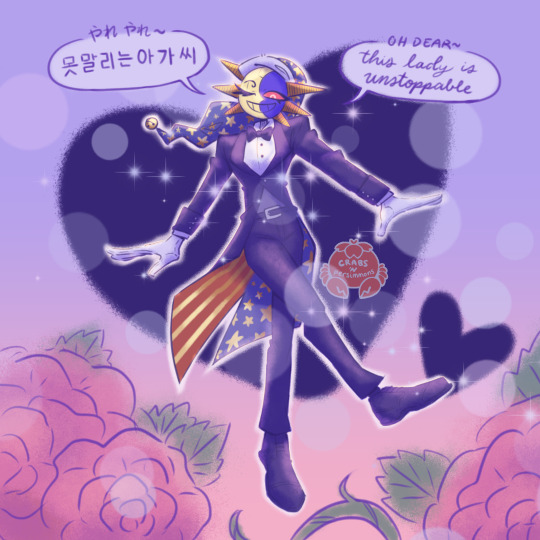
Miss, it's time to go to bed. Are you on your phone again? Sleeping late will ruin your lovely skin. This is the final warning. If you don't fall asleep now, We are going to dance. - "잘자요 아가씨" by ASMRZ
found this song and i was possessed to draw @starriegalaxy's butler Eclipse dancing to it
(also i apologize in advance for my horrendous hiragana, hangul, and cursive)
Textless, effectless version under the cut!
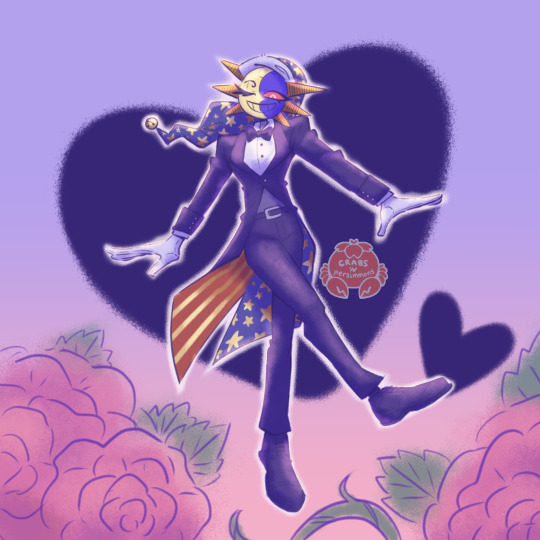
#fnaf eclipse#fnaf dca#dca fandom#fear factor au#he's sweet and multilingual#and his silly little dance will charm you all#the power of shoujo compels you#me drawing the roses: maybe people will be too distracted by the pretty butler bot to notice i don't know what i'm doing#me writing the hiragana hangul and cursive: maybe people will be too distracted by the pretty butler bot to notice i don't know what i'm do#took some creative liberties by giving him a tail coat#because he needed more sway to his silhouette#and i like tail coats#this is also lowkey a surprise for starrie after he presentation today#after i finished drawing i saw another translation that goes#“oh dear mischievous princess”#which is also good#but i like how “this lady is unstoppable” is also kinda motivating too haha#i'm not fluent so i don't know which is closer tho#i know “やれやれ” can be translated to “good grief” but i felt like “oh dear” fit the tone better#crab art#digital art#bright colours#okay i'm going to bed now before butler Eclipse dances the night away
140 notes
·
View notes
Text


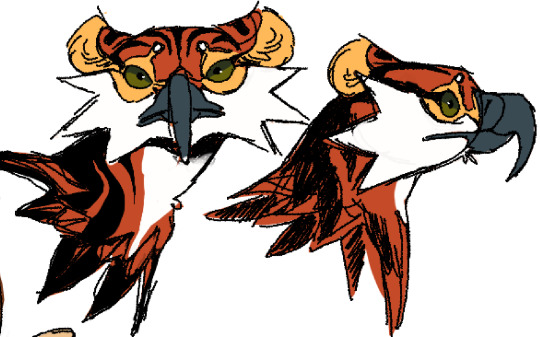
tiger osprey. she is my son
#redesign of a cat owl who was named oswald#I feel the name doesn’t fit as well anymore actually#also I’m starting to feel that I’m using the tags incorrectly I’m not tumblr fluent I’m afraid#art#cute#cool#oc#cute art#cute pets#fantasy#ocart#artist#oc art#tiger#bengal tiger#bengal#tiger art#Osprey#bird#birds#bird art#creature design
62 notes
·
View notes
Text
Shawols watching Key’s TikTok video WITHOUT the sound on:

Shawols watching Key’s TikTok video WITH the sound on:

#shinee#key#kim kibum#tiktok#listen at your own risk#i PROMISE YOU it will not be what you expect#all the shawols that woke up to this video… i’m so sorry#but also… what a king for choosing that song for a FIT CHECK video 🤣#slay queen#key you are too fluent in english to be dancing to that song with a straight face#onkey#jongkey#minkey#taekey#ot5#5hinee
89 notes
·
View notes
Text
just endlessly amused by the director of analytics for the habs being deemed a jock-to-nerd interpreter by his tech guy on an analytics panel. hell yeah bruther thats your Director he rearranges the beautiful signs and symbols and gives them to the coach in a way that wont cause you all to be thrown out . these conversations must be mediated by someone who can understand jockspeak AND number
#i am being silly of course bc many coaches are nerds (panelist later says people arrive at coaching in many ways) and im sure#many analysts were jocks in a past life or are very fluent.#really interesting to hear a Tool Builder's perspective on how it all fits together. three distinct parts#1) having a translator. 2) building a language you can share. and 3) getting the coaches to put the information in the order they like#and yeah that DOES sound like an excellent way to get people to buy into your newfangled methods when the institution is like...#notoriously wary of things that aren't the fuckin. sniff test.#p!res:personal
10 notes
·
View notes
Note
Oh, Jing Yuan! A question: the little finches... sparrows??? Whatever they are... how do you like their company? They seem to like you very much and feel safe enough to shelter in your hair. I don't know what the Xianzhou may think about it but I'd say that a high sign of trust, which if little small creatures like them feel safe with you, I think that is undoubtedly a sign that you are a good person.
(Ooc: HI ERU ALSO SCREAMS BECAUSE OMG BEST JING YUAN AAAAA HE IS MY FAVORITE AND BIG COMFORT CHARACTER AND ALSO MY CHOSEN HUSBANDO SO FINDING BEING DIRECTED TO YOUR ACCOUNT WAS DAY MADE)
“Those little, harmless critters that flock me at specific times of the days?” He finds himself chuckling fondly at the memories of peace, but he finds his gaze towards yours, the softness remaining on his features, but his eyes were calculating to the comment of him being someone of decent, if not, high praise.
A good person, she says. He remains silent, but the corners of his lips rise into an expression of warmth. “You flatter me, you do, however,” his eyes averts from yours, towards the scenery of the Ambrosial Arbor tree, his gaze distant, and reminiscing.
“Had it not for my status as the beholder of the Reignbow Arbiter's wishes, had it not been for my fierceness in strategy that led me to a high position, had it not for this title, this life,”
He pauses, looking over his shoulder, his former expression shifting into a somber smile. “I would've been able to accept your statements to the fullest, with great gratitude,”
“But know,” he turns around to your direction, fully, a calculative and authorative look looms over his features. “That those little, fleeting birds, have no clue as to what I have done, nor they will ever find out what I currently do.”
“Good, you describe me,” his face falls, down to his desk, his expression softening, saddening, casting shadow over the table. “Long overdue, is what I would describe myself.”
His head perks up, in realization to his rambling, and the additional added air of sorrow, thickly unpleasant. “Forgive me and my ramblings,” he sighs, giving you a forced smile, with one hand up and covering half of his face.
“How unsightly of the Arbiter General, truly.”
#[ ✧ ] — Hourly Leisures#ooc below tags.#honkai star rail rp#hsr rp#jing yuan rp#jing yuan#jing yuan roleplay blog#jing yuan rp blog#honkai star rail roleplay#jing yuan x reader#[ ✧ ] — ooc ; eru is interrupting#Please. This is truly flattering but I wouldn't say the best. I discourage your compliments but I'll still give you my appreciation anyways.#Also Jing Yuan's fluent in yappanese and trauma. Apologies for such a long response. (But I also found it to be quite fitting)
90 notes
·
View notes
Text
BATFILES: Dick Grayson
FULL NAME: Richard John Grayson
ALIAS: Nightwing, prev. Robin
DATE OF BIRTH: March 21, 1991
HAIR: Black, wavy and thick
EYES: Dark blue
SKINTONE: Deep tan
HEIGHT: 5'10"/177cm
WEIGHT: 175lbs/80kg
ETHNIC BACKGROUND: Romani (tracing back to Spain, Romania, France and India mainly)
DISTINCTIVE SCARS AND MARKINGS: moles on face and body, piercing scar on left earlobe, small scar on chin
LANGUAGES: English, Romani (not fluent anymore), Japanese, Mandarin, Cantonese, Russian, Spanish, French, ASL (not entirely fluent), and some Tamaran
ADDITIONAL INFORMATION: suffers from regular pain in left knee due to injury acquired during early Nightwing days
#dick grayson#nightwing#dc comics#dc universe#headcanon#dc headcanon#romani dick grayson#I'm gonna go back and edit this 1000 times but here it is#I wanted to include some random facts but I didn't really know where to fit them#Dick is excellent at picking up languages#he might canonly speak more than Bruce#don't quote me on that though#as upsetting as it is I don't imagine he is fluent in his mother tongue anymore#and it does upset him#maybe he can find a way to be more fluent again#we will see where his story takes him#and thats right he had an earring when he was 17-22#he had it at the same time as the mullet#beautiful#and the discowing suit#he doesn't see the problem#batfiles
76 notes
·
View notes
Text
In 24 hours have gone from booking Paris as an afterthought to thinking I could easily move here ❤️
#I am fluent in French I have a trenchcoat I could fit right in#I think my last trip was just a series of unfortunate events#which soured me on the city#this time even though the weather is shit the vibes are immaculate
7 notes
·
View notes
Note
i love only you. -- from yqy to higu uwu
prompts for a little jealousy ( accepting ) — @deadn30n
Here Yue Qingyuan is, open and all too sincere — almost blindingly so. And there Hiromi is, with the very tip of his tail flicking as if irked. Yet what reason does he have to be peeved? Such a tender, heartachingly sweet admission is being gifted unto him and he's three ticks away from giving airplane ears.
Make it make sense, but that's exactly the issue. He can't. Rather, Hiromi can, but that means he has to acknowledge how ... 'unpleasantly concerned' he'd been. Jealous, in layman's terms.

Thwap! Again, the side of his tail thunks against the nearest surface and he huffs. Deep and labored in such a way that makes it seem as if he'd been inconvenienced. And he has, hasn't he? What else could he categorize such blatant flirting to his partner in broad daylight? In public and right in front of him?
Hiromi likes to think he ended that situation cordially. Well, politely ... alright, expeditiously. Not his fault that stranger had a weak stomach when it comes to accountability. It wasn't that at all. He downright glowered with an intensity that could've burned a hole through carbon steel. Whatever, that's all behind them now — physically. He's still mulling over the audacity as every inch of him clings to Yue Qingyuan.
"Didn't like they way you were being looked at," Hiromi grumbles into the alcove of his partner's shoulder; where he's been sulking ever since they got home. Another huff and he's dragging his face back up. Noses along the line of his neck and tries not to thump his tail again. Keyword — tries. "I love you too, so much. If anyone looks at me like that, let me know and I'll hightail it out of there."
What a completely idiotic and dramatic thing to say.
#* & all the best — answered .#deadn30n#* & fluent in legalese — dialogue .#* & like nya? — bakeneko verse .#// im having a FIT over this
1 note
·
View note
Text

winks with both eyes @basbousah ゚.+:。∩(・ω・)∩゚.+:。
#&&.⠀so sit next to me,for i,too,am fluent in silence.⠀ —⠀ basbousah. ( alhaitham )#iM SO BAD AT COMING UP WITH TAGS /WEEPSS#BUT THIS QUOTE ..... IS VV FITTING FOR THEM METHINKS..#🥺🥹😭🫶💖💞💕#h.akuno in all her mighty 160 centimeters is def on her tippy-toes here btw SGFKWHFJ IT BE LIKE THAT !!#&&. out of
11 notes
·
View notes
Note
In a post that was… a long time ago, you put in the tags:
“i JUST wrote an essay on this omfg i have SO many thoughts about sir gawain and the green knight”
The post was about how Gawain literally had no way to win in SGATGK. You were talking in the tags about shame culture and the instability of the moral culture and symbols and identity and the like, and I was wondering….Do you have a link to that essay or something?
If not then that’s totally fine, I just ALSO have many thoughts on sir Gawain and the green knight and love not only the poem but the essays and academic articles and stuff surrounding it, and that essay honestly sounds really interesting and cool! So I thought I’d ask, but yeah!
Hey Anon! First of all, thanks so much for coming into my inbox to talk Sir Gawain with me - a very unexpected but very welcome surprise! I'd completely forgotten about that post I reblogged, but yeah, I took a Middle English paper in my second year of uni, and the Sir Gawain essay was my favourite one to research all term. It's just such a fun poem, and like you said, there's so much great discussion to delve into for it. It's been a little while since I thought about it though, so it's so fun to have a reason to shift my brain back into medieval mode again!
It was just a weekly essay (we had to write an essay each week on a different text/author/group of texts), so it was rather frantically researched and wasn't something I was able to spend loads of time on. I don't think I came to any particularly new or interesting conclusions, and I didn't post it anywhere or anything. That said, given that it's pretty short, I'm happy to copy and paste it here for you if you'd like to read it! Like all my uni essays, it was written the day before the deadline in a slightly sleep deprived haze, so it's not the best thing written on Gawain by a long shot, but it'd be lovely to have someone outside of my supervisor read it! Obviously just please don't use it anywhere or plagiarise it, but I assume that goes without saying lol
If you do get around to reading it, I'd love to hear your thoughts! But no pressure at all ofc - honestly it's just super nice to be asked! I'll put it below a read more, along with my sources - thanks again for the lovely message anon :)
‘For man may hyden his harme, bot unhap ne may hit, For there hit ones is tached twynne wil hit never.’ What do you understand to be the meaning and significance of Gawain’s last words?
Despite Gawain's confidence in asserting the green gridle as a signal of his fundamentally flawed nature, Sir Gawain and the Green Knight deliberately complicates the reader's ability to interpret the girdle - and by extension, the poem's moral - in such easy metaphorical terms. Gawain's initial symbol, the pentangle, embodies an honour system which sees morality as intertwined with reputation, making Gawain's apparent goodness into a static symbol whose worth depends on its ability to be interpreted by others. By replacing it with the girdle, the poem alludes to the instability of a community-based chivalric moral code. In offering the reader multiple interpretations of the girdle, with Gawain's held in no higher narrative esteem than Arthur's or the Green Knight's, the poem suggests the limitations of relying on community for moral validation, which ultimately leads to a performance rather than practice of morality, and therefore stunts any opportunity for personal growth.
Gawain’s certainty in labelling the girdle a metaphorical scar, to ‘remorde to myselven/ The faut and the fayntyse of the flesch crabbed’ (2434-35), is immediately challenged by two alternative perspectives – the Green Knight’s, and Arthur’s.[1] The Green Knight suggests Gawain take the girdle as little more than a trophy, ‘a pure token/ Of the chaunce of the Grene Chapel at chivalrous knightes.’ (2398-99), ‘pure’ acting in direct antithesis to the charge of sin that Gawain lays against it. Arthur and the court, meanwhile, have an emotionally opposed reaction to Gawain, greeting his morose confession by ‘Laughen loude thereat’ (2514), and appropriating Gawain’s symbol of personal shame into one of communal honour: ‘For that was accorded the renoun of the Rounde Table,/ And he honoured that hit had evermore after.’ (2519-20). The poet presents the reader with three inharmonious definitions, with no individual appearing the obvious source of authority. Thus, Gawain’s attempt at using the girdle to signify a universal truth in his aphoristic statement, ‘man may hyden his harme, but unhap ne may hit’ (2511) is radically undermined. Through offering, and refusing to discredit, alternating interpretations, the Gawain-poet makes his own description of the girdle’s ‘abelef as a buderyk bounden by [Gawain’s] side’ (2485) ironic in the passivity of its phrasing – Gawain may say that ‘unhap ne may hit’, but Arthur’s swift reinterpretation of the girdle repositions it from absolute symbol to simply a belt that Gawain has tied to suit his subjective purposes, and may just as easily untie. This ending marks a significant transformation for the reader’s understanding of the Romantic world Gawain inhabits, previously one in which symbols and epithets can be interpreted to indicate moral truth about an individual; a transition made clear in the movement from the pentangle as Gawain’s symbol, which Ralph Hanna describes as ‘the emblem of a world where meaning is clear and exemplary’ to the girdle, ‘to which meaning must be assigned’.[2] The Gawain-poet upholds the pentangle for its symbolic potential, pausing the narrative to interject, ‘And why the pantangel apendes to that prince noble/ I am in tente you to telle’ (623-24). The and the details provided in relation to the pentangle – ‘Hit is a synge that Salomon sette sumwhyle’ (625)’, ‘Englych hit callen/ Overal, as I here’ (629-30) appeal to the desire for a symbol with absolute meaning. The interpretation that follows of the pentangle’s application to Gawain, representing his five virtues, associates the accuracy of historical and linguistic information about the symbol with the apparently also objective information it relays about Gawain’s moral character. As Putter and Stokes suggest, ‘ethics and aesthetics come very close together in this poem’; in a reputation-based society, a kind of metaphorical vision is encouraged, which allows symbols like Gawain’s pentangle to be correctly interpreted as indicative of his nature.[3] Thus, the Gawain-poet provides the reader with the girdle as an alluring signification of an absolute moral truth, only to complicate this moral to such an extent that the girdle comes to signify the opposite, replacing the pentangle’s moral idealism and certainty with the suggestion that morality may be subjective.
Fitting to his interpretation of the girdle, the Green Knight disdains the kind of performative morality that underlies the reputation-based structure of Arthur’s court, associating it with the pride he has apparently come to test. Thus, he announces, ‘What, is this Arthures house […]. That all the rous rennes of thurgh ryalmes so mony? Where is now your sorqudrye and your conquests[..]/?’ (309-311). The Green Knight’s condescending tone relies upon the inevitable tension between the hyperbolic tales he is aware of, and the disappointing reality. There is a metatextual element to this speech, as the contemporary reader, too, would have heard tales of Arthur’s court’s ‘conquests’, and thus what is within the text a challenge to the pride of Arthur’s court becomes an implicit challenge of the implausibility of the Romance genre. As Ad Putter suggests, in Sir Gawain, the poet appears to deliberately use this fantastical genre to pose ‘an interpretative challenge […] how can we take it seriously?’[4] His response is to explore the psychological ramifications of existing as a character within this canon. As Gawain’s despair at the end of the poem indicates, this mythological society in which reputation is paramount has a fragile moral core. When Gawain flinches during the beheading scene, the Green Knight chastises him by saying ‘Thou art not Gawan’ (2270), alluding to his famed reputation. But what this truly reveals is that no one can be ‘Gawan’, who would not fear his head under a falling axe – within a genre predicated on hyperbolic acts of knightly courage, the Gawain-poet radically asserts the humanity that underlies Gawain’s character and makes living up to his generic reputation impossible. In doing so, the poem not only further undercuts Gawain’s shame at not fulfilling this reputation, but it discredits the entire notion of morality based on chivalry – based, fundamentally, on how good one is judged to be by others, rather than by an internalised moral compass. As A.C. Spearing suggests, the ramifications of this society manifest in a ‘criteria of conduct […] not fully internalized’: thus, Gawain ‘fails to recognize’ that his initial retention of the girdle ‘is a sin’ until it infringes on his reputation – that being, until the Green Knight reveals his knowledge of it.[5] Like Arthur, who responds to the Green Knight’s challenge of the court’s reputation by blushing – ‘The blod schotte for schame into his schyre face’ (317), Gawain, caught out in his lie, feels ���All the blod of his brest blende in his face,/ That all he schrank for schame’ (2371-72). Their identical responses betray how Gawain’s embarrassment at his contradicted reputation, rather than actual feelings of moral guilt, lie at the core of the shame he associates with the girdle.
The poem thus exposes the flaws of a communal morality system, in which morality becomes more rigid and absolute – either the individual does, or does not, maintain their idealised reputation. Hence, Gawain’s assertion that if he is flawed, he must be fundamentally flawed: ‘Now am I fauty and false, and ferde have ben ever’ (2382). In this sense, the poem’s ending is further unsettling, as Arthur’s absorption of the girdle as a performance piece into the mythos of the court signifies his ignorance as to the dangers of this [MS1] structure. He continues to assume an externalised identity predicated on reputation, and as such, will continue not to scrutinise himself internally. Gawain may view the girdle as a metaphor for shame, and Arthur for honour, but, as David Aers notes, ‘none of this is of much consequence since nothing much will change anyway’; the absolutism of the Arthurian court prevents moral development.[6] The poem’s ending becomes bathetic, as the self-destruction inherent to the Arthurian court is stressed in the characters’ ignorance to their need for moral progression. Indeed, this is made all the more tragic as Gawain has already demonstrated within the poem that he can progress towards his idealised reputation, even if he can never truly fulfil its requirements. When he initially places his head down to receive the Green Knight’s blow, Gawain ‘[shrinks] a little with the schulderes for the scharp yrne’ (2267). As the Green Knight notes, such an act is contrary to his hyperbolically brave reputation, as ‘Gawan […] that is so good holden,/ That never arwed for no here.’ (2270-71). However, Gawain’s response demonstrates his ability to grow towards this role, as he determines not to flinch a second time, and successfully ‘graythly hit bides and glent with no member’ (2292). As Ralph Hanna suggests, the beheading scene is heavily charged with symbolism connoting rebirth, from the New Year setting, to the description of Gawain ‘Never syn that he was burn born of his moder/ [….] half so blythe’ (2320-21), to the spilling of his blood onto white snow, which Hanna calls ‘a tabula rasa on which Gawain must learn to write what he […] is now.’[7] If Gawain has emerged from a metaphorical death morally absolved and able to discover himself anew, then the positive potential of this revelation is immediately squandered in his curt refusal of Bertilak’s invitation back to his castle. His identity is still wholly externalised, and therefore his first instinct upon gaining an apparent greater self-understanding is to return to the court to vocalise it.The Arthurian court has a holistic and restrictive grip on individual identity in Sir Gawain, inescapable not because there is no opportunity to do so, but because the knights themselves – represented in Gawain and Arthur’s definitions of the girdle as still performatively signalling their reputations, just as the pentangle did – are ignorant of the very ways in which their potential is stunted by the structures they inhabit.
In showing the multiple, often conflicting meanings the girdle is given, the poem uses Gawain’s quest of self-discovery to destabilise the very moral structure at the core of the Arthurian court. In doing so, Sir Gawain and the Green Knight suggests the limitations of an external moral compass, and instead encourages the cultivation of the kind of more nuanced, internalised mortality that Gawain fails to realise.
Sources I quoted from: These are definitely worth reading in their own rights, since they express everything I had to say, and do so far better than second-year me ever could! You might have already read it, but if not, I'd particularly recommend the Spearing. I loved his interpretation, and it ended up forming most of the basis for my argument.
[1] The Works of the Gawain Poet: Sir Gawain and the Green Knight, Pearl, Cleanness, Patience, ed. by Ad Putter and Myra Stokes (London: Penguin Classics, 2014), p.401; all further references to this text will be made in the body of the essay.
[2] Ralph Hanna III, ‘Unlocking What’s Locked: Gawain’s Green Girdle’, Viator, 14 (1983), 289-302 (p.290).
[3] Putter and Stokes, ‘Foreword to Sir Gawain and the Green Knight’, The Works of the Gawain Poet, p.246.
[4] Ad Putter, An Introduction to the Gawain Poet (London; New York: Longman, 1996), p.45.
[5] A.C. Spearing, The Gawain-Poet; A Critical Study (Cambridge: Cambridge University Press, 1970), pp.224- 25.
[6] David Aers, ‘Christianity for Courtly Subjects: Reflections on the Gawain-Poet’ in A Companion to the Gawain-Poet, ed. by Derek Brewer and Jonathan Gibson (Woodbridge, Suffolk: D.S. Brewer, 1997), p.99.
[7] Hanna, pp.295-96.
#asks#life stuff#need to change that tag to something more fitting#like...idk....#talking about stuff#or something#anyways thank you anon! i hope you enjoy :)#lol love that the first place ive ever posted an essay of mine is tumblr#feels fitting tbh feels right#i still havent watched the dev patel green knight#shameful of me ik#man maybe i should reread it now#middle english i miss youuuu#for our paper the eng department asked us all to teach ourselves middle english and then just proceeded to teach us as if we were fluent#which was kinda hilarious ngl#some of the stuff was pretty intuitive but some of it was uh....less so#the putter and stokes edition has really good explanatory notes though#i owe them a lot lmao
3 notes
·
View notes
Text
richard ríos would be such a porto signing if we had any money, truly cannot have shit in this house 😔
#colombian playing in brazil#stepping stone club in europe would do him good#likeable piece of shit#he'd fit in so well 🙂↔️#and he's already fluent in portuguese#gonna start talking like sporting supporters and say the tiktok views would pay his transfer fees#anywayyyyyy#literally had this dude i'm talking to sending me stuff about him like yes i know 🧍🏻♀️#ana shut up omg
2 notes
·
View notes
Text
nosaka: english is a difficult language. it can be understood through tough thorough thought, though. hiroto: you need to stop.
#noa talks: hc that nosaka is fluent in english. it would fit#inazuma eleven#ina11#areori#nosaka yuuma#kira hiroto#inazuma eleven incorrect quotes#incorrect quotes
17 notes
·
View notes
Text
so because I've decided to put aside my frustrations with the french language (and every other language that genders random words but I have a grudge against french specifically just because it's what I was required to learn in school and nobody could explain to me why some words were masculine and some were feminine) and finally buckle down and learn M.ichif (which utilizes a bit of french), I figure if I make Wardell be M.étis (like me irl lol) then maybe he can speak the language and teach Dandy, and by using him to teach my self-insert then hopefully I can help my actual real life self learn it too ,,,,, there are a couple flaws in the plan but I think overall this might work fhfkdl we shall see.... Wardell is going to be m.etis either way though LOL he would love the fiddling and jigging and overall culture so it is canon now :]
#yayyyy cultural connections with characters :]#still not sure how to fit that into my pkmn s/i but I'll get there eventually fjfkfl#anyways wish me luck i guess LOL I don't know how learning a language is going to go for me#I've learned a little bit of Norwegian in highschool and learned the starting bits of Gaelic/Irish after i graduated#but i didnt get very far in either#and now i can read/speak what is affectionately referred to as ''cereal box french'' LOL#meaning i learned it all throughout school but im nowhere near fluent but can recognize and pronounce a good few words#so .... not much proper experience trying to learn a language but im determined to learn m.ichif 😤#dandy.cmd#🕯️the warmth of your doorways
3 notes
·
View notes
Note
WDYM the way ppl type can give away they're Brazilian
it's not really how they type, it's the way that different languages shape different perspectives of how a language is structured and how it works and when you start speaking another one it tends to leave a residue from the rules of your first one (or previous ones) that don't necessarily apply to the new language: certain ways of arranging words in a sentence that range from "wrong" to "somewhat uncommon", unknown expressions and turns-of-phrase (likely transliterations), ways of writing out words that seem too intentional to be typos (likely an attempt at reaching an equivalent to the same word in a different language), some even-harder-to-explain cultural markers in priorities, emphasis, cursing, w/e. it varies from more to less obvious depending on the person's proficiency at the target language but i feel like it's occasionally present even at a very advanced level.
and bc i'm someone who learned how to speak english from the internet with portuguese as my first language and having done and still doing some certain "portuguesefications" of english i can often very easily spot them in the wild because it'll be like, a sentence written in english that sounds kinda weird that i intuitively transliterate in my head to brazilian portuguese and it immediately sounds more natural. an easy example is the brazilian guy who went viral in junk press sites asking a girl on twitter to help w his english homework, how when he says "here we have english class" it's not like, wrong, but it is weird, or more importantly weirder than when you say in portuguese, "aqui a gente tem aula de inglês", which is what he was clearly trying to translate into english.
one thing that i personally still do in that regard is how i tend to suppress the "I" in sentences where "I" is the subject and its at the start of the sentence (e.g. "I was about to leave" into just "was about to leave") which is not like, unusual enough that people would spot me for it but in my case is bc in portuguese that is more standard because it has much more extensive verb conjugation than english, such that you can pretty much always tell who the subject of a verb is without having to say it in its own secluded word making it borderline redundant to do so. a great example i saw recently was an english subtitling of Chico Buarque's Construção, where bc of this limitation of english every verse has to start with "He" to denote the subject, when in the original every verse starts with just the verb bc it's already clarified who did the action ("comeu", "subiu", "ergueu", "amou" etc. are all already verb conjugations that refer only to past 3rd person singular). it's not unique to portuguese enough that you could clock me immediately either, i don't think, but compounding with other markers in someone's speech would be enough to give me pause and check if they're brazilian, which i can almost always verify by checking their blogs bc we're obsessed with making our presence in the gringa known
#anon#answers#don't know where in this yet again too long reply to fit this but also bears saying#at a fluent level of english you don't need to think in portuguese first and then translate into english#if i'm writing in english i think in english.#but i'm pointing out that even when that's the case there's still some markers of your other languages permeating your speech#they're just not segregated neatly!
4 notes
·
View notes
Text
Saw a girl on tik tok, say itach gives Turkish vibes, and boyyyyyyyy they are so right So I will explain my reasons why I think so:
1. Turkey, just like most Arab countries, loves cats so much its probably flooded with them.
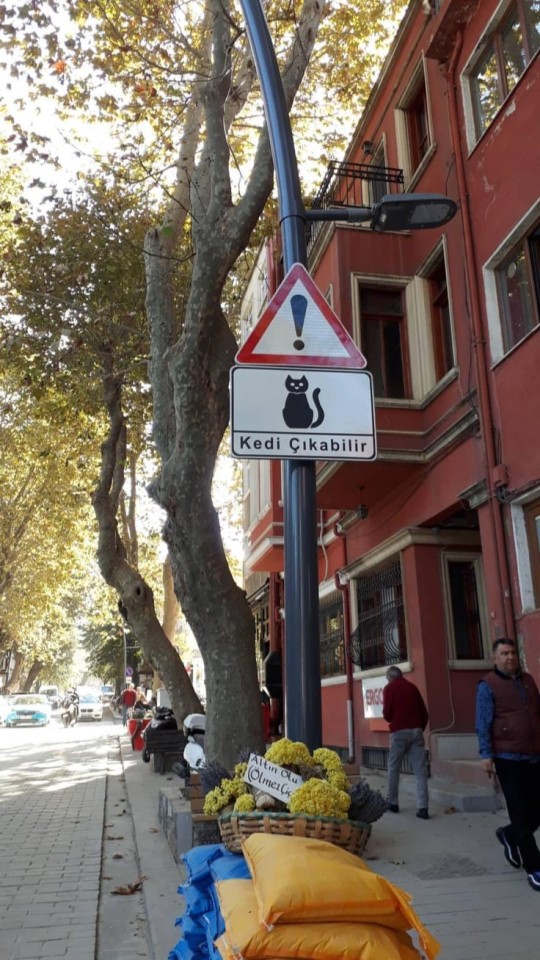
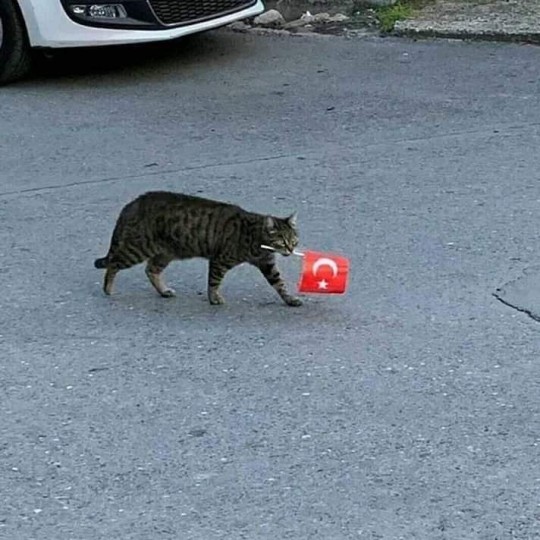
2. The tea. Sure, they're got coffee too, but in every Turkish series, you will see this on the table all the time.

3. Historically speaking, the sons of the sulltan have to kill each other in order to get the throne. The daughters are fine and unaffected, but the sons do some brother killing. ( coming from someone that has seen both sulejman and kosem and let me tell you for the longest time, it was advised to kill your brother. Otherwise, the other option was to get killed. We know which option itachi would choose in that situation )
There's probably more, but I had to get these 3 off my chest. Ahh, and another thing, turkish people will call complete strangers "abi- brother or ablla- sister".
Don't know how these fit itachi, but in my head, the math is mathing.
#this is coming from someone whose country was considered part of the ottoman empyrie for 500 years untill we fought for liberty#also as someone who has seen minimum 50 long turkish series with my family#again my points are “ itachi from the cat clan”#“itachi loves tea”#and the bond between brothers turkish people have#alsooooo his Japanese va has that deep voice that makes me think that itachi could speak fluent turkish#its fitting to me#anyways#itachi#itachi uchiha
5 notes
·
View notes